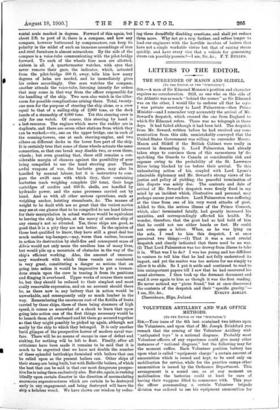LETTERS TO THE EDITOR.
THE SURRENDER OF MASON AND SLIDELL. (TO THZ EDITOR OF THE "SPECTATOR."] Sin,—A man of Sir Edmund Monson's position and character requires no corroboration. Still, as one who on this side of the Atlantic was as much " behind the scenes " as Sir Edmund was on the other, I would like to endorse all that he says. I was private secretary to Lord Palmerston—then Prime Minister—and I remember very accurately the arrival of Mr. Seward's despatch, which crossed the one frOm England to which Sir Edmund refers. There was no telegraph in those days. It had failed although it had been laid. The despatch from Mr. Seward, written before he had received any com- munication from this side, unmistakably conveyed that the United States Government was willing to surrender Messrs. Mason and Slidell if the British Cabinet were really in earnest in demanding it. Lord Palmerston had already taken steps to convince them of this earnestness by de- spatching the Guards to Canada at considerable risk and expense owing to the probability of the St. Lawrence River being blocked by ice before their arrival. To this unhesitating action of his, coupled with Lord Lyons's admirable diplomacy and Mr. Seward's strong views of the justice and policy of yielding, the peaceful termination of this dispute was solely due. The contents and date of arrival of Mr. Seward's despatch were firmly fixed in my mind by an incident which, illustrative and personal, may perhaps amuse your readers. Lord Palmerston was suffering at the time from one of his very worst attacks of gout. Added to this, the serious illness of the Prince Consort, which, alas! terminated fatally, had greatly increased his anxieties, and correspondingly affected his health. No wonder, therefore, that the gout had so laid hold of him that he could not use either hands or feet. He could not even open a letter. When, as he was lying on the sofa, I read to him this despatch, I at once perceived two things :—(l) That it was a most crucial despatch and clearly indicated that there need be no war. (2) That Lord Palmerston was too drowsy from illness to take it in. What was I to do ? I was too young and too diffident to venture to tell him that he had not fully understood its import, and yet the matter was too serious for me simply to allow it to slide. So I put it aside and continued to read to him unimportant papers till I saw that he had recovered his usual alertness. I then took up the dormant document and read it over again to him as though it was the first reading. He never noticed my " pious fraud," but at once discovered the contents of the despatch and their " specific gravity."—
I am, Sir, &c., EVELYN ASHLEY. Classiabawn, Sligo, Ireland.


































 Previous page
Previous page